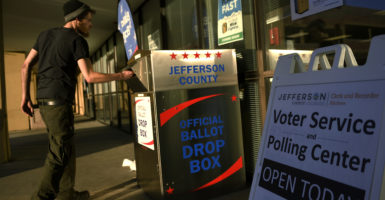Americans willing to volunteer their time to ensure that only lawful votes are cast and counted in upcoming elections got a critical piece of advice during the Conservative Political Action Conference.
“A lot of you know about voter ID,” former Justice Department lawyer J. Christian Adams said Friday at CPAC, the annual gathering of conservative activists just outside Washington. “But that’s yesterday’s issue and it is 10 years old. Voter ID is not the solution; the left has moved on.”
The “next battle space,” Adams said, involves illegal immigrants who acquire driver’s licenses that enable them to become registered voters.
For concerned citizens to be successful in efforts to ensure ballot integrity, they must set the “right priorities” and focus their attention on where the left now operates, he said.
Adams, part of the Justice Department’s Voting Section from 2005 to 2010, was one of three panelists in a breakout session on voter fraud at CPAC.
The others were Hans von Spakovsky, a senior legal analyst at The Heritage Foundation who manages the think tank’s Election Law Reform Initiative, and John Fund, a columnist for National Review and Fox News. Both men have written at length on voter fraud.
“The next battle space is alien registration,” Adams said.
The federal “motor voter” law requires state motor vehicle agencies to offer voter registration forms when residents apply for a driver’s license. The law also requires other social service agencies to offer voter registration forms to applicants who seek health and welfare benefits.
As part of the process, applicants are asked to check a box on the voter registration form to indicate whether they are citizens.
Checking a box is a “flawed system,” Adams said, because “states are not checking for citizenship.”
Adams is president and general counsel of the nonprofit Public Interest Legal Foundation, which has been asking state agencies to release records showing how many noncitizens were registered to vote before that registration was canceled.
What is commonly known as “motor voter” is Section 7 of the National Voter Registration Act of 1993. Section 8, however, requires state officials to periodically clean up voter rolls and remove voters who are dead or ineligible for another reason.
Evidence of Voter Suppression ‘Not There’
Since “lots of elections are close,” voter fraud can make a difference and change outcomes, von Spakovsky said.
That point was made by the Supreme Court in 2008 when it upheld a voter ID law in Indiana, he told the audience.
Von Spakovsky, also a former Justice Department lawyer, said that “folks on the far left are opposed to anything that would improve ballot integrity.”
He also was dismissive of arguments that link voter identification requirements with what liberals routinely call “voter suppression.”
Section 2 of the Voting Rights Act of 1965 explicitly outlaws voter suppression, von Spakovsky noted. Yet, President Barack Obama’s Justice Department filed only five Section 2 cases over eight years after President George W. Bush’s Justice Department filed 15 in eight years, he said.
“The evidence is not there [for voter suppression],” von Spakovsky said.
He cited recent studies, including one from The Heritage Foundation, that concluded voter ID laws do not affect voter turnout.
“The idea that voter ID causes voter suppression is not true,” von Spakovsky said.
Database on Election Fraud
The Heritage legal analyst did express concern that state election officials are falling down on the job in some critical areas.
“State officials are not doing enough to ensure that noncitizens are not registering and voting,” von Spakovsky said. “States are also not verifying citizenship, and they are not cleaning up the voter rolls of people who are deceased or who have moved away.”
The Heritage Foundation’s Election Fraud Database “uses a very strict process” to determine the extent of voter fraud in America, he said.
Heritage analysts count only actual convictions in a court of law and those cases where a judge or election board orders a new election, he said. The latest figures from the database identify 1,177 proven instances of voter fraud.
Fund, who co-authored a book on voter fraud with von Spakovsky called “Who’s Counting?,” had some insight and advice for conservative activists.
“If you defend voter ID, you will be attacked as racist or engaging in voter suppression,” Fund said. “If you raise this issue, they will distort the facts and attack you. But you can either bring this up or lose elections. There is no safe third way.”
‘Psychological Projection’ by Liberals
Fund described examples of voter fraud in Democratic primaries in Detroit and St. Louis. He said the same political operatives who deny that voter fraud takes place and accuse others of racism and voter suppression often are the most blatant practitioners of voter fraud.
“This is a form of psychological projection,” Fund said. “They are attacking you for their own behavior.”
The media doesn’t report on examples of voter fraud in Democratic primaries in inner cities because “it does not fit their narrative,” he said, adding:
That’s how media bias works. It’s not so much how they skew what they are covering, it’s what they don’t cover and leave out. Who do you think runs the machines of the worst cities in this country?
Every American is a victim of voter fraud, Fund said, because anytime a fraudulent vote is counted it means a legitimate vote is canceled out.
Von Spakovsky closed the session with a warning about the dangers associated with HR1, the first bill to be introduced in the Democrat-controlled House of Representatives in 2019.
A Heritage fact sheet circulated by von Spakovksy during the session presents the bill Democrats cast as anti-corruption legislation as actually damaging to states’ authority and a way to open the door to more voter fraud.
CPAC, the largest annual national gathering of conservative activists ran through Saturday at the Gaylord National Resort and Convention Center in National Harbor, Maryland, just outside Washington.





























